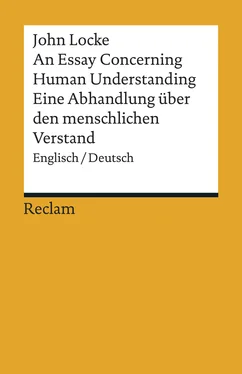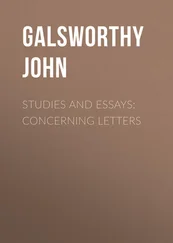1 ...7 8 9 11 12 13 ...37 § 7. Men then come to be furnished with fewer or more simple Ideas from without, according as the Objects , they converse with, afford greater or less variety; and from the Operation of their Minds within, according as they more or less reflect on them. […]
§ 8. And hence we see the Reason, why ’tis pretty late, before most Children get Ideas of the Operations of their own Minds; and some have not any very clear, or perfect Ideas of the greatest part of them all their Lives. Because, though they pass there continually; yet like floating Visions, they make not deep Impressions enough, to leave in the Mind clear distinct lasting Ideas , till the Understanding turns inwards upon it self, reflects on its own Operations , and makes them the Object of its own Contemplation. […]
[100]§ 9. To ask, at what time a Man has first any Ideas, is to ask, when he begins to perceive; having Ideas , and Perception being the same thing. I know it is an Opinion, that the Soul always thinks, and that it has the actual Perception of Ideas in it self constantly, as long as it exists; and that actual thinking is as inseparable from the Soul, as actual Extension is from the Body; which if true, to enquire after the beginning of a Man’s Ideas , is the same, as to enquire after the beginning of his Soul. For by this Account, Soul and its Ideas , as Body and its Extension, will begin to exist both at the same time.
§ 10. […] I confess my self, to have one of those dull Souls, that doth not perceive it self always to contemplate Ideas , nor can conceive it any more necessary for the Soul always to think , than for the Body always to move; the perception of Ideas being (as I conceive) to the Soul, what motion is to the Body, not its Essence, but one of its Operations […]. We know certainly by Experience, that we sometimes think, and thence draw this infallible Consequence, That there is something in us, that has a Power to think: But whether that Substance perpetually thinks, or no, we can be no farther assured, than Experience informs us. For to say, that actual thinking is essential to the Soul, and inseparable from it, is to beg, what is in Question, and not to prove it by Reason; which is necessary to be done, if it be not a self-evident Proposition […].
[…]
[102]§ 12. The Soul, during sound Sleep, thinks, say these Men. Whilst it thinks and perceives, it is capable certainly of those of Delight or Trouble, as well as any other Perceptions; and it must necessarily be conscious of its own Perceptions . But it has all this apart: The sleeping Man, ’tis plain, is conscious of nothing of all this. Let us suppose then the Soul of Castor , whilst he is sleeping, retired from his Body, which is no impossible Supposition for the Men I have here to do with, who so liberally allow Life, without a thinking Soul to all other Animals. These Men cannot then judge it impossible, or a contradiction, That the Body should live without the Soul; nor that the Soul should subsist and think, or have Perception, even Perception of Happiness or Misery, without the Body. Let us then, as I say, suppose the Soul of Castor separated, during his Sleep, from his Body, to think apart. Let us suppose too, that it chuses for its Scene of Thinking, the Body of another Man, v. g. Pollux , who is sleeping without a Soul: For if Castor ’s Soul can think whilst Castor is asleep, what Castor is never conscious of, ’tis no matter what Place it chuses to think in. We have here then the Bodies of two Men with only one Soul between them, which we will suppose to sleep and wake by turns; and the Soul still thinking in the waking Man, whereof the sleeping Man is never conscious, has never the least Perception. I ask then, Whether Castor and Pollux , thus, with only one Soul between them, which thinks and perceives in one, what the other is never conscious of, nor is concerned for, are not two as distinct Persons, as Castor and Hercules ; or, as Socrates and Plato were? And [104]whether one of them might not be very happy, and the other very miserable? Just by the same Reason, they make the Soul and the Man two Persons, who make the Soul think apart, what the Man is not conscious of. For, I suppose, no body will make Identity of Persons, to consist in the Soul’s being united to the very same numerical Particles of matter: For if that be necessary to Identity, ’twill be impossible, in that constant flux of the Particles of our Bodies, that any Man should be the same Person, two days, or two moments together.
§ 13. Thus, methinks, every drowsy Nod shakes their Doctrine, who teach, That the Soul is always thinking. […]
[…]
§ 24. […] the first capacity of Humane Intellect, is, That the mind is fitted to receive the Impressions made on it; either, through the Senses , by outward Objects; or by its own Operations, when it reflects on them. This is the first step a Man makes towards the Discovery of any thing, and the Groundwork, whereon to build all those Notions, which ever he shall have naturally in this World. All those sublime Thoughts, which towre above the Clouds, and reach as high as Heaven it self, take their Rise and Footing here: In all that great Extent wherein the mind wanders, in those remote Speculations, it may seem to be elevated with, it stirs not one jot beyond those Ideas , which Sense or Reflection , have offered for its Contemplation.
§ 25. In this Part, the Understanding is meerly passive ; and whether or no, it will have these Beginnings, and as it were materials of Knowledge, is not in its own Power. For the Objects [106]of our Senses, do, many of them, obtrude their particular Ideas upon our minds, whether we will or no: And the Operations of our minds, will not let us be without, at least some obscure Notions of them. No Man, can be wholly ignorant of what he does, when he thinks. These simple Ideas , when offered to the mind, the Understanding can no more refuse to have, nor alter, when they are imprinted, nor blot them out, and make new ones in it self, than a mirror can refuse, alter, or obliterate the images or Ideas , which, the Objects set before it, do therein produce. As the Bodies that surround us, do diversly affect our Organs, the mind is forced to receive the Impressions; and cannot avoid the Perception of those Ideas that are annexed to them.
Of simple Ideas
§ 1. THE better to understand the Nature, Manner, and Extent of our Knowledge, one thing is carefully to be observed, concerning the Ideas we have; and that is, That some of them are simple , and some complex .
Though the Qualities that affect our Senses, are, in the things themselves, so united and blended, that there is no separation, no distance between them; yet ’tis plain, the Ideas they produce in the Mind, enter by the Senses simple and unmixed. For though the Sight and Touch often take in from the [108]same Object, at the same time, different Ideas ; as a Man sees at once Motion and Colour; the Hand feels Softness and Warmth in the same piece of Wax: Yet the simple Ideas thus united in the same Subject, are as perfectly distinct, as those that come in by different Senses. The coldness and hardness, which a Man feels in a piece of Ice , being as distinct Ideas in the Mind, as the Smell and Whiteness of a Lily; or as the taste of Sugar, and smell of a Rose: And there is nothing can be plainer to a Man, than the clear and distinct Perception he has of those simple Ideas ; which being each in it self uncompounded, contains in it nothing but one uniform Appearance , or Conception in the mind, and is not distinguishable into different Ideas .
Читать дальше












